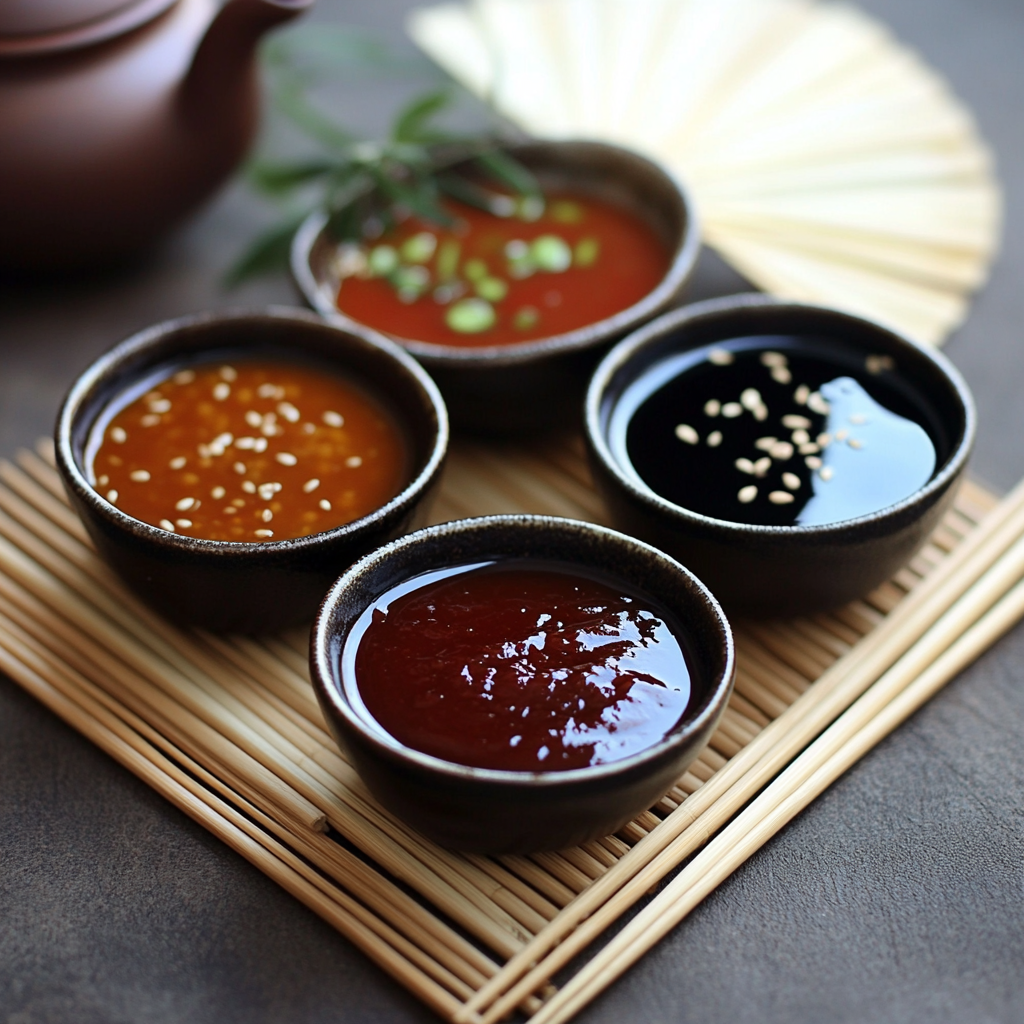Barbecue sauces are enjoyed worldwide, but Japanese barbecue sauce offers a unique combination of flavors. With its balance of umami, sweetness, and savory notes, this sauce has become a staple in Japanese cuisine and is gaining popularity globally. Let’s dive into what makes Japanese BBQ sauce different, how it’s used, and why you should add it to your cooking.
- What is the Japanese Version of Barbecue Sauce?
- Key Ingredients of Japanese Barbecue Sauce
- Japanese Barbecue Methods
- Comparing Japanese BBQ Sauce to Other BBQ Sauces
- Popular Brands and Variations of Japanese BBQ Sauce
- Modern Uses and Recipes Featuring Japanese BBQ Sauce
- Dietary Considerations and Adaptations
- FAQs
- Conclusion
What is the Japanese Version of Barbecue Sauce?
The Japanese version of barbecue sauce, called tare, is a flavorful sauce often used for grilling dishes like yakiniku (grilled meat) and yakitori (grilled chicken skewers). It combines ingredients such as soy sauce, mirin, sake, and aromatics like garlic and ginger. These elements create a balanced, complex taste that enhances the natural flavors of the food.
Unlike Western barbecue sauces, which tend to be smoky or tangy, Japanese BBQ sauce focuses more on umami and sweetness. To explore how to make your own, check out this Japanese BBQ sauce recipe. Additionally, for more insights into the role of this sauce in Japanese grilling, read this guide to what makes Japanese barbecue sauce different.
Key Ingredients of Japanese Barbecue Sauce
Soy Sauce: The Umami Base
Soy sauce serves as the foundation of Japanese BBQ sauce. It delivers the rich, savory umami flavor that defines the sauce. As a key component of Japanese cooking, soy sauce works perfectly to deepen the overall taste of the sauce.
Mirin and Sake: Sweetness and Balance
Mirin (a sweet rice wine) and sake give the sauce its gentle sweetness. Together, these ingredients create a balanced flavor that pairs well with both meats and vegetables. Their slight sweetness complements the saltiness of the soy sauce, making the sauce well-rounded.
Aromatics: Garlic, Ginger, and Green Onion
Garlic, ginger, and green onion bring freshness and a bit of spice to Japanese BBQ sauce. These aromatics not only enhance the flavor but also give the sauce a fragrance that adds to its appeal.
Japanese Barbecue Methods
Yakiniku: Grilled Meat Perfection
In yakiniku, thin slices of meat are grilled over an open flame, then served with dipping sauces like tare. The sauce’s blend of umami and sweetness perfectly complements the grilled meat. This makes yakiniku one of the most popular grilling styles in Japan.
Yakitori: Grilled Chicken Skewers
Yakitori refers to grilled chicken skewers that are brushed with Japanese BBQ sauce during cooking. As the sauce caramelizes on the meat, it creates a crispy, flavorful glaze. Unlike yakiniku, where the sauce is used for dipping, yakitori relies on the sauce as a glaze, making the dish both crispy and juicy.
For another delicious dish that uses bold flavors, try this avocado salsa recipe, which pairs well with grilled meats.
Comparing Japanese BBQ Sauce to Other BBQ Sauces
Japanese BBQ Sauce vs. American BBQ Sauce
American barbecue sauces often have bold, smoky flavors from ingredients like vinegar, mustard, and tomatoes. In contrast, Japanese BBQ sauce takes a lighter approach by using soy sauce, mirin, and umami. This balance helps to bring out the natural flavors of the grilled meat rather than overpowering them.
Japanese BBQ Sauce vs. Korean BBQ Sauce
Korean BBQ sauce shares some similarities, such as the use of soy sauce and garlic. However, it is often spicier due to ingredients like gochujang (chili paste). On the other hand, Japanese BBQ sauce tends to focus more on sweetness and umami while keeping the flavor milder.
Popular Brands and Variations of Japanese BBQ Sauce
Bachan’s Japanese Barbecue Sauce
Bachan’s is one of the most popular brands of Japanese BBQ sauce. Known for its high-quality, non-GMO ingredients, it delivers authentic flavors and works well with various grilled dishes.
Jojoen Yakiniku BBQ Sauce
This sauce blends Japanese and Korean influences to create a slightly spicy yet sweet flavor. It’s perfect for grilling all kinds of meats.
Gyu-kaku BBQ Sauce
A commercial version, Gyu-kaku BBQ sauce is available worldwide and features the characteristic umami and sweetness found in traditional Japanese sauces. It’s a good option for those new to Japanese BBQ sauce.
Modern Uses and Recipes Featuring Japanese BBQ Sauce
Everyday Dishes with Japanese BBQ Sauce
Although it’s traditionally used for grilling, Japanese BBQ sauce can be incorporated into a variety of everyday dishes, such as:
- Stir-fries
- Rice bowls
- Pizza (as a BBQ sauce substitute)
- Roasted vegetables
Dipping Sauce
This sauce also makes an excellent dipping sauce for dumplings, fried vegetables, or sushi. The balance of umami and sweetness adds depth to each bite.
Creative Recipes
Try these creative dishes featuring Japanese BBQ sauce:
- Beef chow fun
- Crispy roasted potatoes with caramelized sauce
- Yuzu summer grilled corn
Dietary Considerations and Adaptations
Is Japanese BBQ Sauce Gluten-Free?
Unfortunately, traditional Japanese BBQ sauce is not gluten-free because soy sauce often contains gluten. However, gluten-free options are available that use tamari or other gluten-free alternatives.
Vegan and Vegetarian Variations
You can easily adapt Japanese BBQ sauce for vegan or vegetarian diets by substituting any non-vegan ingredients. This ensures the sauce remains flavorful while accommodating various dietary needs.
FAQs
- What is the Japanese version of barbecue sauce?
The Japanese version is called tare, made from soy sauce, mirin, and other ingredients. - How is Japanese BBQ sauce different from Western BBQ sauces?
It emphasizes umami and sweetness, using soy sauce rather than smoky or tangy flavors found in Western sauces. - Can you use Japanese BBQ sauce as a marinade?
Yes, it works well as a marinade for grilling meats like beef and chicken. - Is Japanese BBQ sauce spicy?
Traditional Japanese BBQ sauce is not spicy, but some versions include a hint of heat. - What dishes pair well with Japanese BBQ sauce?
This sauce pairs well with grilled meats, stir-fries, and roasted vegetables.
Conclusion
Japanese barbecue sauce combines umami, sweetness, and savory elements, making it an ideal addition to many dishes. Whether you’re grilling meats or preparing stir-fries, this sauce enhances the flavors of your meals. For more culinary inspiration, check out this guide to famous Hokkaido cookies, another delightful part of Japanese cuisine.

